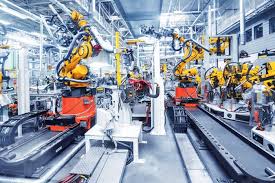Mechanical engineering continues to push the boundaries of technology, offering groundbreaking solutions and innovations. As we step into 2024, the field is poised for remarkable advancements that promise to reshape industries and improve everyday life. This article explores the top 10 mechanical engineering innovations to watch for in 2024, showcasing the cutting-edge technologies and concepts that are set to make a significant impact.
1. Advanced Robotics and Automation

Robotics and automation are advancing rapidly, driven by developments in artificial intelligence and machine learning. In 2024, expect to see more sophisticated robots capable of performing complex tasks with increased precision and adaptability. Innovations include collaborative robots (cobots) that work alongside humans and autonomous robots for industrial and healthcare applications.
- Key Innovations: AI-powered robots, advanced cobots, autonomous mobile robots (AMRs).
- Impact: Increased efficiency in manufacturing, improved safety, and enhanced productivity.
2. 3D Printing and Additive Manufacturing
3D printing technology is revolutionizing manufacturing processes by enabling the creation of complex parts with minimal waste. In 2024, advancements in additive manufacturing will focus on improving material properties, increasing printing speed, and expanding the range of printable materials. This innovation is poised to enhance custom manufacturing and rapid prototyping.
- Key Innovations: Multi-material 3D printing, large-scale additive manufacturing, improved print resolutions.
- Impact: Customization of products, reduction in material waste, and accelerated design processes.
3. Smart Materials and Structures
Smart materials and structures respond to external stimuli such as temperature, pressure, and electrical signals. In 2024, advancements will include materials with enhanced self-healing properties, shape-memory alloys, and responsive polymers. These innovations will lead to more resilient and adaptive engineering solutions for aerospace, automotive, and civil engineering.
- Key Innovations: Self-healing materials, shape-memory alloys, responsive polymers.
- Impact: Improved durability, enhanced performance, and innovative design possibilities.
4. Sustainable and Green Engineering
Sustainability is a major focus in mechanical engineering, with an emphasis on reducing environmental impact and improving energy efficiency. Innovations in green engineering will include the development of eco-friendly manufacturing processes, renewable energy technologies, and advanced waste management systems.
- Key Innovations: Green manufacturing techniques, energy-efficient systems, waste-to-energy technologies.
- Impact: Reduction in carbon footprint, promotion of sustainable practices, and conservation of resources.
5. Next-Generation Thermal Management Systems

Efficient thermal management is crucial for the performance and longevity of electronic devices and machinery. In 2024, new thermal management solutions will focus on advanced heat dissipation techniques, such as improved heat sinks, phase-change materials, and thermal interface materials.
- Key Innovations: Advanced heat sinks, phase-change materials, improved thermal interface materials.
- Impact: Enhanced performance and reliability of electronic devices, reduced overheating issues.
6. Bioengineering and Medical Devices
Mechanical engineering innovations are playing a vital role in bioengineering and the development of advanced medical devices. In 2024, expect to see breakthroughs in prosthetics, wearable health monitors, and surgical robots that improve patient outcomes and healthcare delivery.
- Key Innovations: Advanced prosthetics, wearable health monitoring devices, robotic-assisted surgeries.
- Impact: Improved patient care, enhanced medical procedures, and increased accessibility to advanced healthcare.
7. Autonomous Vehicles and Transportation Systems
The development of autonomous vehicles is transforming the transportation industry. Innovations in autonomous driving technologies, including advanced sensors, machine learning algorithms, and vehicle-to-everything (V2X) communication, will be prominent in 2024.
- Key Innovations: Autonomous driving systems, V2X communication, advanced driver assistance systems (ADAS).
- Impact: Increased safety, reduced traffic congestion, and enhanced transportation efficiency.
8. Advanced Simulation and Modeling Techniques
Simulation and modeling are essential for designing and testing complex systems. In 2024, advancements in computational techniques, including real-time simulations and high-fidelity modeling, will improve the accuracy and efficiency of engineering analysis and design processes.
- Key Innovations: Real-time simulation tools, high-fidelity modeling, advanced computational techniques.
- Impact: Improved design accuracy, faster validation processes, and optimized engineering solutions.
9. Robotic Exoskeletons and Wearable Technology
Robotic exoskeletons and wearable technology are advancing rapidly, providing enhanced mobility and support for individuals with physical disabilities or those working in demanding environments. Innovations in this field will focus on improving comfort, functionality, and affordability.
- Key Innovations: Improved exoskeleton designs, advanced wearable technology, enhanced user interfaces.
- Impact: Increased mobility and independence, improved workplace safety, and enhanced quality of life.
10. Next-Generation Energy Storage Systems

Energy storage is a critical component in managing and utilizing renewable energy sources. In 2024, advancements in energy storage technologies, including next-generation batteries and supercapacitors, will enhance energy efficiency and support the transition to renewable energy systems.
- Key Innovations: Advanced battery technologies, high-capacity supercapacitors, improved energy storage solutions.
- Impact: Increased energy efficiency, support for renewable energy integration, and reduced reliance on fossil fuels.
Conclusion
The mechanical engineering innovations highlighted for 2024 represent a diverse range of advancements with the potential to reshape industries and improve daily life. From robotics and 3D printing to sustainable engineering and energy storage, these technologies are paving the way for a more efficient, sustainable, and advanced future. Keeping an eye on these trends will be crucial for professionals, businesses, and technology enthusiasts looking to stay ahead in the ever-evolving field of mechanical engineering



